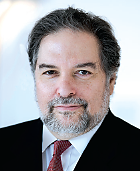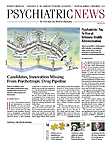On October 14, the United States Supreme Court heard oral arguments in a case, which APA joined as an amicus curiae with other medical organizations, that arose from disagreement about what constitutes the “practice of dentistry” in North Carolina and challenged the role of the state dental board in the regulation of dentistry (see page 22). In oral arguments, some of the justices recognized the value of having medical specialists make decisions that impact medical care. Both Justice Scalia and Justice Breyer, uncommonly allied, acknowledged that regardless of the result of the antitrust question before them, both would want to see physicians, rather than a group of bureaucrats, deciding who should practice brain surgery. Psychiatrists clearly understand that the oversight of medical practice is not a small matter.
The justices’ comments arrived on the heels of recent discussions about scope of practice and legislation proposing pathways to “prescriptive” privileges. So it’s timely to consider these important issues, which have engaged the medical community in general and psychiatrists, among others, in particular. My use of quotation marks around the term “prescriptive” is purposeful, as I think it misconstrues the issues surrounding the mid-level practice of medicine, and the practice of medicine more broadly of which, of course, psychiatry is a part.
The licensure of physicians in the United States is often described as a full or unlimited license to practice medicine. While this is usually limited by training, hospital privileges, and other forms of credentialing, it nevertheless contains an important concept: that physicians evaluate and diagnose patients and prescribe treatment without an a priori requirement for supervision or oversight by another professional. Now obviously this does not prevent physicians from seeking consultation from others—indeed, good practice mandates such efforts when clinical circumstances warrant—but the core of the independent practice of medicine remains.
The prescription of pharmaceutical agents is, however, only one step, and a late one at that, in the clinical reasoning that must begin with the comprehensive evaluation of patients and a consideration of the differential diagnosis of what could be causing a patient’s symptoms. This can be followed by laboratory testing, physical and neurologic exams, radiologic studies, and continued clinical assessment and reassessment. This process of ongoing evaluation fully applies to patients with psychiatric symptoms as much as any other patient group, and perhaps more so. We know that patients with psychiatric illness have higher rates of medical illness than cohorts without psychiatric illness and that many general medical disorders can cause psychiatric symptoms or can directly influence the course and response to care of psychiatric illnesses. And all of this is the practice of medicine that psychiatrists perform daily before they ever decide whether a pharmaceutical agent should be prescribed. Thus, prescribing represents only one component of the practice of medicine, and one that is dependent upon broad and detailed medical knowledge.
Perhaps two clinical examples, disguised to protect confidentiality, will help illustrate my point:
A 42-year-old man was seen in the emergency room of a large general hospital. After an initial examination by the internal medicine house staff, a psychiatry resident was called to evaluate the patient for hysterical blindness. On examination, the patient was cooperative with the examiner, had fluent and coherent speech, and was concerned that he couldn’t see. He failed to track the examiner and on closer inspection had widely dilated pupils bilaterally and no impairment of level of consciousness or peripheral long track signs. Babinski’s reflex was not present. The patient’s pupils did not react to light, and the patient had no blink reflex to vigorous confrontation, suggesting he could not see. The psychiatry resident suspected a drug effect and, on gathering further history, discovered that the patient had access to quinine of which he had taken an overdose. Quinine is known to produce “quinine blindness” by binding in a reversible but toxic way to the retina, essentially disconnecting the retina from the central nervous system and rendering the patient temporarily, but actually, blind. He fully recovered without treatment 12 hours later.
A second—but more common—problem confronted a resident caring for a 63-year-old woman. The patient had had recurrent major depression for which a combination of psychotherapy and medication had been highly effective, allowing her to return to her normal work and social commitments. However, she began to experience lower abdominal distress, eventually accompanied by low-grade fevers and night sweats. Despite the resident’s concern, her patient’s complaints were dismissed at a local walk-in clinic, especially after her psychiatric history became known. It was only when the patient presented with worsening abdominal symptoms that the psychiatry resident accompanied her patient to the emergency room and spoke directly to the ER attending. She made sure her patient’s full clinical history was understood and assisted in the diagnosis of an abdominal abscess, at risk for rupture, which was surgically removed, allowing the patient to fully recover. Despite the involvement of other physicians in the care of these patients, absent the direct role of psychiatrists, the proper diagnosis and care of these patients would not have occurred.
The practice of medicine is far more complex, and fraught with risk, than the antiseptic phrase “prescriptive privileges” would suggest. Indeed, those who would seek to obtain authority for that component of medical practice, without at a minimum the training and education that physician assistants and nurse practitioners undergo, reveal their fundamental failure to understand the nature of disease, psychiatric and otherwise. As well, they show their lack of understanding of the complexity of the process of evaluation and decision making in the practice of medicine and inter alia demonstrate why they should not have the privileges they seek without comprehensive biomedical training.
As Hippocrates reminded us, ars longa, vita brevis … iudicium difficile—the art is long, life is short, judgment difficult. Indeed. We need to make sure his warning, and the complexity of real clinical care, is well understood by all who would make policy in this very important area. Our patients and their families deserve no less. ■

